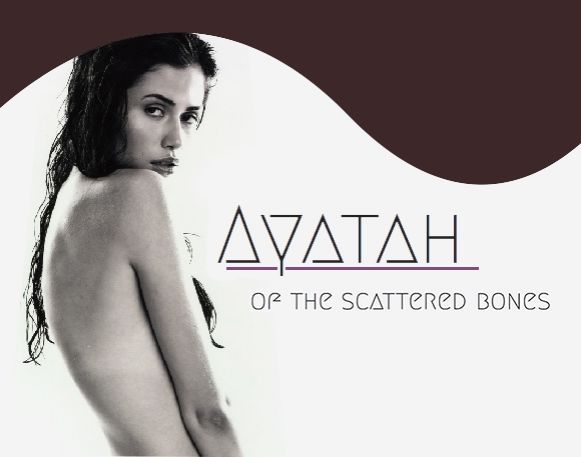
When in Rome.
|| 1st Summer, 514AV || Zeltiva ||
.
|| 1st Summer, 514AV || Zeltiva ||
It had been well over a year since Ayatah moved to Zeltiva, and the one of the first things she had learnt was that a Myrian accent was not a welcome one. Whenever she first spoke, people would comment on how foreign she sounded, how exotic. And these were good words! She was interesting, unique. But as soon as she had answered 'I am Myrian', the intrigue ended and the wary looks ensued. Mothers would gather up their children to pull them away from the strange, glittery savage, and shopkeepers would suddenly have no interest in her custom.
It was the children who were her favourite people in the city. They were honest and more trusting in their confusion: you don't look like a savage, does that mean you won't eat me? It gave Aya an opportunity to explain herself; no, I have not come all the way to Zeltiva to eat children, I came here to learn.
Once, completely fed up with being treated like a beast, Ayatah had done the unthinkable. She had claimed to be Eypharian. She'd even lied and said that there was such a thing as two-armed Eypharians, they were just much rarer than their four- or six-armed counterparts. When this explanation was used, the woman she had been speaking with had allowed her daughter to touch Ayatah's gilded skin whilst the two woman chatted away. She had made her first friend based on a lie.
It made her sick to think that for a brief tick she had abandoned her Myrian heritage in favour of the desert-dwelling people. Ayatah of the Scattered Bones had denied her clan and Goddess-Queen. It had taken her two whole days pluck up the courage to leave her university dorms and venture out into the streets after that episode. She would not lie again, but it was nearly impossible for Aya to exist in a city that detested her maternal people.
But there was a glimmer of hope.
Clearly, people did not realise she was Myrian straight away; they had to be told as such. So, if she did not speak with that intriguing accent, it would not come to light that she was Myrian, and so nobody would cower away from her. She might even be able to have an actual conversation! She would need to drastically alter how she spoke Common, but the promise of socialisation and potential friendship was enough to make her want to try.
Ayatah started the process by listening. Despite having been surrounded by the Zeltivan accent for a year, she had not truly listened to how the words were shaped, where the emphases were and the highs-and-lows of sentence structure. The places of Zeltiva were always busy, so Aya would sit outside for bells at a time, listening in to snippets of conversations. She quickly realised just how diverse the accents in Zeltiva were: the brutish, gruffness of the sailors at the Docks, how those living in West Street spoke in haughty-taughty voices as if a Tskanna tusk was permanently wedged in the anus. Her favourite place was the Kelp Bar, where she could melt into the shadows with a drink and not be bothered. People got drunk there, and when people got drunk, they spoke more. She would constantly make notes of what people said, and slowly the linguistic patterns of Zeltiva began to appear in her records. For example, 'darling' (or, if the speaker was a sailor, 'darlin') was a term of endearment that men used for women - but not, as Ayatah had first expected, just their lovers. 'Darling' could mean barmaid, pretty woman, whore, shopkeeper, child, old woman, homeless woman, and -- most confusingly -- a close male friend. Women barely said darling, and if they did it was usually in a catty way to show their dominance to a rival female ('Oh darling, that scarf is just div-ine!).
It was a confusing mass of strange lexical rules that Aya would never have known to exist had she stayed in Taloba. A woman on West Street and a woman on East Street would say the same words in completely different ways: the first would say 'Pardon me', whereas the latter might say 'Par-dun meh', after passing gas (actually, Aya learnt eventually, the former woman would never admit to such a ghastly activity).
It was the children who were her favourite people in the city. They were honest and more trusting in their confusion: you don't look like a savage, does that mean you won't eat me? It gave Aya an opportunity to explain herself; no, I have not come all the way to Zeltiva to eat children, I came here to learn.
Once, completely fed up with being treated like a beast, Ayatah had done the unthinkable. She had claimed to be Eypharian. She'd even lied and said that there was such a thing as two-armed Eypharians, they were just much rarer than their four- or six-armed counterparts. When this explanation was used, the woman she had been speaking with had allowed her daughter to touch Ayatah's gilded skin whilst the two woman chatted away. She had made her first friend based on a lie.
It made her sick to think that for a brief tick she had abandoned her Myrian heritage in favour of the desert-dwelling people. Ayatah of the Scattered Bones had denied her clan and Goddess-Queen. It had taken her two whole days pluck up the courage to leave her university dorms and venture out into the streets after that episode. She would not lie again, but it was nearly impossible for Aya to exist in a city that detested her maternal people.
But there was a glimmer of hope.
Clearly, people did not realise she was Myrian straight away; they had to be told as such. So, if she did not speak with that intriguing accent, it would not come to light that she was Myrian, and so nobody would cower away from her. She might even be able to have an actual conversation! She would need to drastically alter how she spoke Common, but the promise of socialisation and potential friendship was enough to make her want to try.
Ayatah started the process by listening. Despite having been surrounded by the Zeltivan accent for a year, she had not truly listened to how the words were shaped, where the emphases were and the highs-and-lows of sentence structure. The places of Zeltiva were always busy, so Aya would sit outside for bells at a time, listening in to snippets of conversations. She quickly realised just how diverse the accents in Zeltiva were: the brutish, gruffness of the sailors at the Docks, how those living in West Street spoke in haughty-taughty voices as if a Tskanna tusk was permanently wedged in the anus. Her favourite place was the Kelp Bar, where she could melt into the shadows with a drink and not be bothered. People got drunk there, and when people got drunk, they spoke more. She would constantly make notes of what people said, and slowly the linguistic patterns of Zeltiva began to appear in her records. For example, 'darling' (or, if the speaker was a sailor, 'darlin') was a term of endearment that men used for women - but not, as Ayatah had first expected, just their lovers. 'Darling' could mean barmaid, pretty woman, whore, shopkeeper, child, old woman, homeless woman, and -- most confusingly -- a close male friend. Women barely said darling, and if they did it was usually in a catty way to show their dominance to a rival female ('Oh darling, that scarf is just div-ine!).
It was a confusing mass of strange lexical rules that Aya would never have known to exist had she stayed in Taloba. A woman on West Street and a woman on East Street would say the same words in completely different ways: the first would say 'Pardon me', whereas the latter might say 'Par-dun meh', after passing gas (actually, Aya learnt eventually, the former woman would never admit to such a ghastly activity).
.




